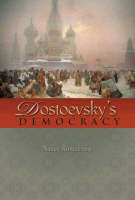
Dostoevsky's Democracy
Princeton University Press (Verlag)
978-0-691-13614-1 (ISBN)
- Titel ist leider vergriffen;
keine Neuauflage - Artikel merken
"Dostoevsky's Democracy" offers a major reinterpretation of the life and work of the great Russian writer by closely reexamining the crucial transitional period between the early works of the 1840s and the important novels of the 1860s. Sentenced to death in 1849 for utopian socialist political activity, the 28-year-old Dostoevsky was subjected to a mock execution and then exiled to Siberia for a decade, including four years in a forced labor camp, where he experienced a crisis of belief. It has been influentially argued that the result of this crisis was a conversion to Russian Orthodoxy and reactionary politics.But "Dostoevsky's Democracy" challenges this view through a close investigation of Dostoevsky's Siberian decade and its most important work, the autobiographical novel "Notes from the House of the Dead" (1861). Nancy Ruttenburg argues that Dostoevsky's crisis was set off by his encounter with common Russians in the labor camp, an experience that led to an intense artistic meditation on what he would call Russian "democratism."
By tracing the effects of this crisis, "Dostoevsky's Democracy" presents a new understanding of Dostoevsky's aesthetic and political development and his role in shaping Russian modernity itself, especially in relation to the preeminent political event of his time, peasant emancipation.
Nancy Ruttenburg is professor of comparative literature, English, and Slavic literatures and chair of the Department of Comparative Literature at New York University. She is the author of "Democratic Personality: Popular Voice and the Trial of American Authorship".
Acknowledgments ix Introduction 1 The Image of the Beast 1 The Ne To and the "Democrat" 6 The Ne To, the Writer, and the People 21 PART I: Building Out the House of the Dead 29 1. "Why Is This Man Alive?": The Unconsummated Conversion 31 2. The Disarticulation of the Autobiographical Self 41 3. Opposites That Do Not Attract (The Bezdna and Poetic Truth) and Opposites That Do (Estrangement and Conversion) 50 4. The Dostoevskian "As If": Self-Deception in Autobiography 61 5. The Narrator's Eclipse 72 6. Dostoevsky's Poetics of Conviction 82 PART II: Building Out the House of the Dead 91 1. The Chronotope of Katorga 93 2. Exception, Equality, Emancipation 96 3. Ontological Ambiguity in the Space of Exception: Katorga as Medium 105 4. The Ontology of Crime: Testimony/Confession 115 5. The Flesh of the Political 140 ? The Grammar of Katorga 141 ? Corporeality and Intercorporeality in Katorga 153 ? Dostoevsky's Democratic Aesthetic 160 Conclusion 170 The Russian People, This Unriddled Sphinx 170 Carmen Horrendum 170 Bookishness, Literacy, and Becoming Democratic 176 Where Have All the Peasants Gone? 183 Notes 197 Bibliography 251 Index 263
| Erscheint lt. Verlag | 21.7.2008 |
|---|---|
| Verlagsort | New Jersey |
| Sprache | englisch |
| Maße | 152 x 235 mm |
| Gewicht | 539 g |
| Themenwelt | Geisteswissenschaften ► Sprach- / Literaturwissenschaft ► Anglistik / Amerikanistik |
| Geisteswissenschaften ► Sprach- / Literaturwissenschaft ► Literaturgeschichte | |
| Geisteswissenschaften ► Sprach- / Literaturwissenschaft ► Literaturwissenschaft | |
| ISBN-10 | 0-691-13614-9 / 0691136149 |
| ISBN-13 | 978-0-691-13614-1 / 9780691136141 |
| Zustand | Neuware |
| Haben Sie eine Frage zum Produkt? |
aus dem Bereich


